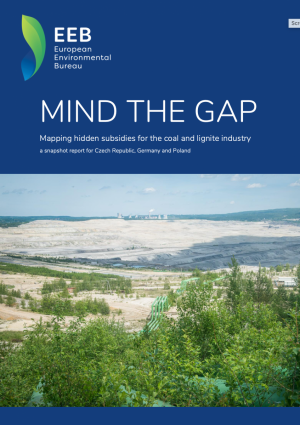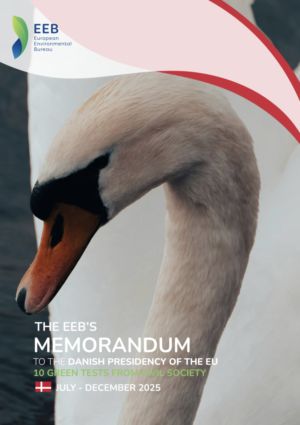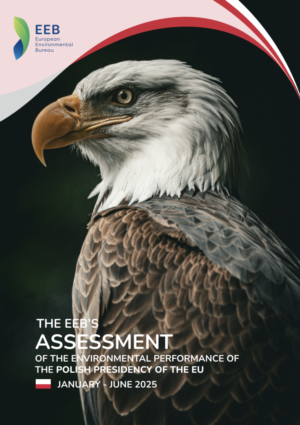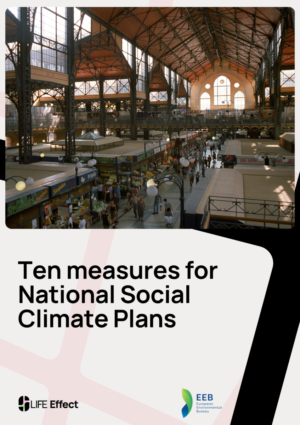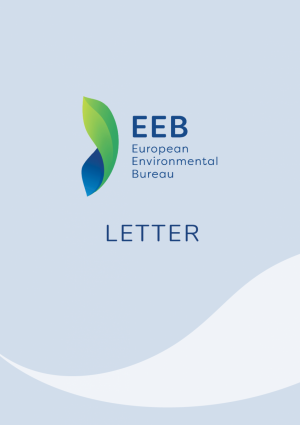
Mind The Gap report
Mapping hidden subsidies for the coal and lignite industry
A snapshot report for Czech Republic, Germany and Poland
The coal industry is thirsty and toxic. Coal and lignite fired thermal combustion plants are responsible for 60% of the EU’s point source industrial CO2 emissions1 and cause 20 000 premature deaths, as well as thousands of cases of chronic bronchitis and asthma, in Europe each year due to their release of sulphur dioxide, nitrous oxides and fine particulate matter2. Lignite mines are abstracting huge quantities of groundwater to keep the pits dry, with effects on the groundwater table kilometers around, as well as causing pollution of ground and surface waters. Coal and lignite combustion plants also abstract large amounts of water for cooling purposes and the intake and discharge of water has negative impacts on the ecological status of the source/recipient water bodies. Lignite and coal combustion also have a negative effect on the chemical status of water bodies, as they are the top source of anthropogenic mercury released to the environment, a very toxic and persistent pollutant subject to phase out under the international Minamata Convention Treaty and the EU Water Framework Directive. The main emission route is via the air (stack), but it can also be deposited to water bodies. Hard coal extraction also has significant impacts on groundwater water, including elevated concentrations of chlorides in groundwater, but this report focuses on the water impacts from open pit lignite mining.
The Water Framework Directive (WFD) is the key piece of EU legislation aimed at ensuring Europe’s water bodies to reach good status. It was one of the first directives to explicitly require the use of economic instruments to reach its goals. According to the WFD, cost recovery of water services should include environmental and resource costs taking into account the polluter pays principle,
This report aims to investigate to what extent the cost recovery principle is being implemented in coal and lignite mining countries across the EU. This first report focusses on Germany, Poland and Czech Republic: EU’s three biggest lignite countries. It presents the different national approaches on water pricing for mine drainage and cooling water abstraction. It also presents findings in relation to availability of water abstraction data in public registers and its user-friendliness.
The main results of this report are the following:
- The EU’s three biggest lignite countries (including the majority of the German lignite-mining federal states) exempt the abstraction of groundwater from open pit lignite mines (mine drainage) from fees despite its negative impact of both groundwater and surface waters. Lignite operators therefore escape the cost recovery principle. This is the case in Poland and in the federal states Saxony and Saxony-Anhalt in Germany (in Brandenburg mine drainage is exempt from fees if the drained water is not further used). Only the federal state of North-Rhine Westphalia has introduced a fee of € 0.05/m3 for mine drainage, which was introduced only as from 2011.
- In Czech Republic, due to an outdated mining law from the 1980s, mine operators can use the water abstracted from mines for free.
- Abstraction of cooling water is typically subjected to lower fees than abstraction for industry or public water use, sometimes without distinguishing between open and closed loop cooling systems
- Availability of water (abstraction) related information as well as information to assess the implementation of the cost-recovery principle at facility level is generally very poor and un-transparent. Only the Czech Republic provides for a user-friendly system where information of volume of water abstraction and discharge for many industrial and commercial activities is available online. There are no open access online databases providing data in Germany or Poland.

